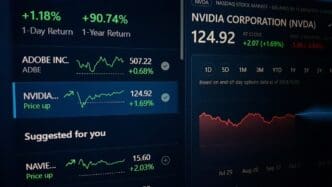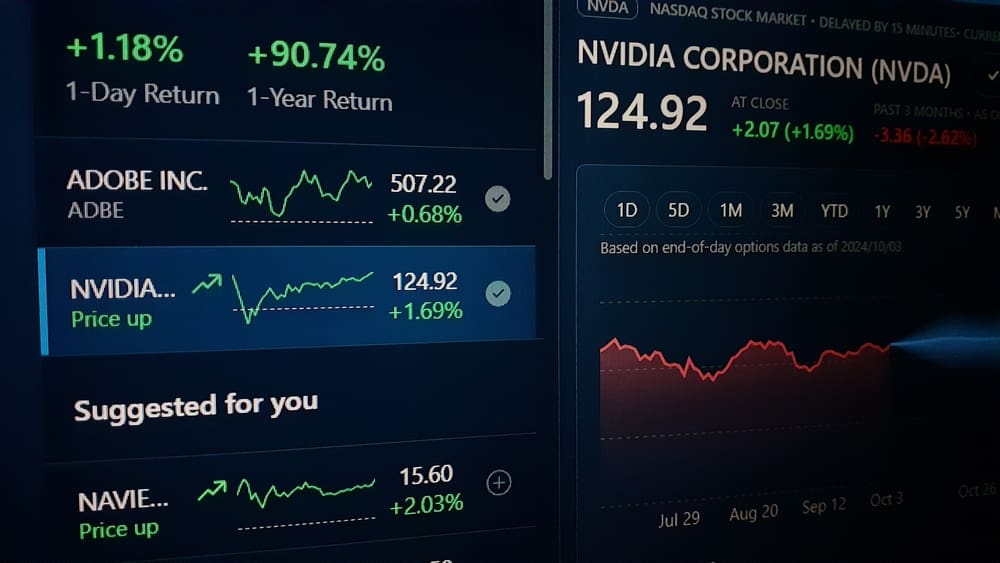Executive Summary
The Story So Far
Why This Matters
Who Thinks What?
Nvidia Corporation’s stock faces the potential for a significant decline of 40% or more, a prospect highlighted by recent market analysis and increased short-selling activity from prominent hedge funds. This outlook is largely driven by the company’s elevated valuation multiples, even as it maintains a dominant position in the rapidly expanding artificial intelligence sector. Investors are urged to consider a long-term perspective on the shares, drawing lessons from historical market cycles for high-growth technology companies.
Hedge Funds Bet Against Nvidia
Several notable investment entities have initiated significant short positions against Nvidia. Reuters reported earlier this year that hedge funds view some of the “Magnificent Seven” tech stocks, including Nvidia, as potentially overvalued. Michael Burry, the investor renowned for his successful bet against the U.S. housing market prior to the 2008 financial crisis, has reportedly joined these bears, with his hedge fund now shorting Nvidia shares.
Valuation Concerns and Historical Precedents
Nvidia currently commands a market capitalization of $4.4 trillion and trades at a price-to-sales ratio of 28. Such a high valuation multiple is considered unusual for a company of its immense scale, as sustained rapid growth becomes increasingly challenging. To illustrate, the world’s total Gross Domestic Product (GDP) is approximately $114 trillion, highlighting the substantial valuation increase Nvidia would require to double in size.
History provides numerous examples of high-hype, high-valuation stocks experiencing substantial corrections. During the dot-com bubble, major technology indexes plummeted by 80% or more, and some previously high-flying companies ultimately ceased operations. While Nvidia is not expected to go out of business, these historical events serve as a cautionary reminder regarding market overvaluation.
Nvidia’s AI Dominance Amidst Volatility
Despite valuation concerns, Nvidia is a critical supplier to the burgeoning artificial intelligence (AI) industry, which is projected to grow by 30% or more annually for the next decade. The company’s graphics processing units (GPUs) hold a dominant market share, a lead solidified by extensive research and development and a robust developer software ecosystem that fosters customer lock-in.
However, these strong fundamentals do not preclude short-term market volatility. Nvidia‘s shares have experienced temporary drops of 20% to 40% in recent years. Seaport Global analyst Jay Goldberg has also predicted a 40% decline in Nvidia stock, advising investors to be prepared for such fluctuations in high-growth, heavily hyped sectors.
Long-Term Investment Outlook
The artificial intelligence revolution is widely regarded as a multi-decade opportunity, comparable in significance to the advent of the internet. Historical parallels, such as Amazon‘s stock losing 90% of its value during the dot-com bubble before taking decades to recover, underscore the importance of a long-term investment horizon for companies like Nvidia. Markets are prone to cycles of overvaluation and undervaluation, even for fundamentally strong businesses.
Key Takeaways
The current market dynamics surrounding Nvidia highlight a tension between its robust industry position and its elevated valuation. Investors are encouraged to balance the long-term potential of the AI industry with an awareness of historical precedents for significant short-term volatility in high-growth stocks. Patience and strategies such as dollar-cost averaging may prove beneficial for those investing in this evolving sector.







